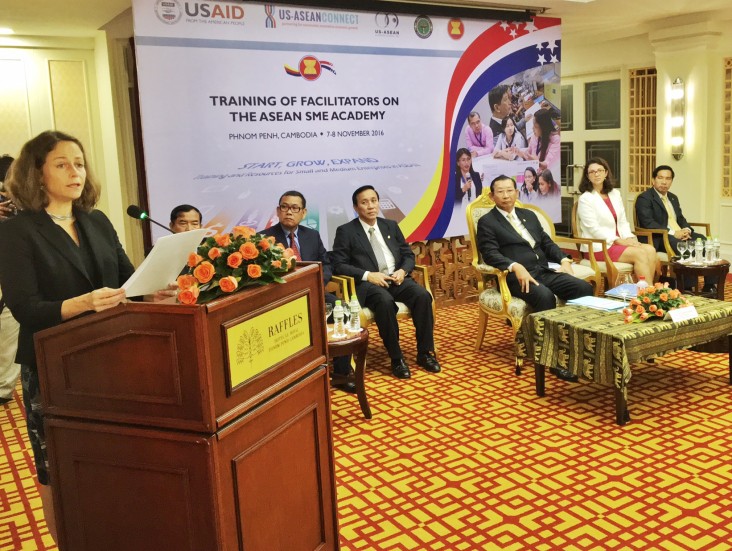
(as prepared for delivery)
- H. E. Dr. Cham Prasidh (CHAM PRA SUDH), Senior Minister for Industry and Handicrafts, Royal Government of Cambodia;
- Distinguished representatives and participants;
- Ladies and Gentlemen
A very good morning to you all. It gives me great pleasure to be here and to extend a warm welcome to everyone at this two-day Training of Facilitators on the ASEAN SME Academy. First of all, let me convey my appreciation to H. E. Dr. Cham Prasidh, Senior Minister for Industry and Handicrafts, and his efficient colleagues in the General Department of SMEs and Handicrafts. The Ministry is a key partner in this event, co-hosting this training, and identifying all the participants.
Speaking of you, the participants, I want to thank those of you who are from outside Phnom Penh, for your keen interest in the training that makes you willing to be away from your homes for a few days. It is great to have representatives here from around the country.
Supporting Small and Medium sized Enterprise development has long been a priority of the Government of the United States as it has for the Royal Government of Cambodia. SMEs are the backbone of much of the global economy. Here in this country, SMEs account for 99 percent of all business firms and 73 percent of business employment, according to a recent study from the East Asia Economic Research Institute for ASEAN and East Asia. As such, a healthy, modern and dynamic SME sector is critical for economic growth, social progress, and regional integration.
But achieving rapid SME growth is not easy. Technological progress and the globalization of trade and investment have greatly increased the speed, efficiency and complexity of the commercial environment worldwide. All business firms, both large and small, must constantly evolve, improve, and upgrade so as to sustain their market shares and competitive advantage under the digital economy.
Against that backdrop, the ASEAN SME Academy is an important and timely catalyst in support of the development and modernization of micro- as well as small and medium enterprises. The Academy was launched at the end of May 2016 and it provides a one-stop platform for self-paced learning and business networking as well as access to wide range of information resources. There are some 52 training courses and 350 web-links available from the Academy at present. Most of the courses are provided by Fortune 500 companies who are partners in the US-ASEAN Business Alliance for Competitive SMEs, a public-private partnership of USAID and the US-ASEAN Business Council.
It is gratifying that ASEAN has highlighted the Academy as an important tool to promote entrepreneurship and human capital development in the “ASEAN Economic Community Blueprint 2025.” This Blueprint is part of the long-term integration roadmap entitled “ASEAN 2025: Forging Ahead Together” adopted by ASEAN Leaders at their Summit in Kuala Lumpur in November 2015. It is expected that participants in our Training of Facilitators programs will use what they learn to go on and train the many micro and small and medium enterprises within their own networks.
This effort also fits in with the U.S.-ASEAN Connect initiative that was launched by President Obama on February 15, 2016 at the U.S.-ASEAN Leaders’ Summit in Sunnylands, California. This important initiative will support regional integration efforts of the ASEAN Economic Community and expand further upon the positive economic ties between the U.S. and ASEAN. The ASEAN SME Academy is part-and-parcel of the Business and Innovation Connect Pillars of the initiative. The Academy will serve as a leading regional online platform in providing training and custom-made business information to assist micro as well as small and medium enterprises to start and grow their businesses.
So what should you expect to learn over the next two days? As part of this course, you all will be introduced to the training materials available from the Academy. These courses cover areas such as finance and accounting, management, marketing, business operations, technology, and trade and logistics. There will also be a discussion of other features of the Academy, including links to sources of support and information for the development and globalization of micro and small and medium enterprises. These sources include a large number of web-links to business service providers in ASEAN countries, with a focus on organizations that provide special services to women entrepreneurs.
But this event is not just designed to teach you about the Academy. We are looking to you for feedback on the courses and materials that are offered so that the Academy can be improved over time. Together with your assistance and support, we can make sure that this unique platform becomes a premier and thriving regional training resource it is meant to be.
I wish you all a very successful training program. Thank you for your attention.
Related Speeches
- Remarks by Polly Dunford, Mission Director, USAID Cambodia, Launch Event of Feed the Future Cambodia Harvest II
- Remarks by Christina Lau, Deputy Director, Office of Public Health and Education, USAID/Cambodia, Opening Ceremony of the Kick-Off Workshop for “One Health Workforce”
- Remarks by Veena Reddy, Deputy Mission Director, USAID Cambodia, EPIC Showcase







Comment
Make a general inquiry or suggest an improvement.